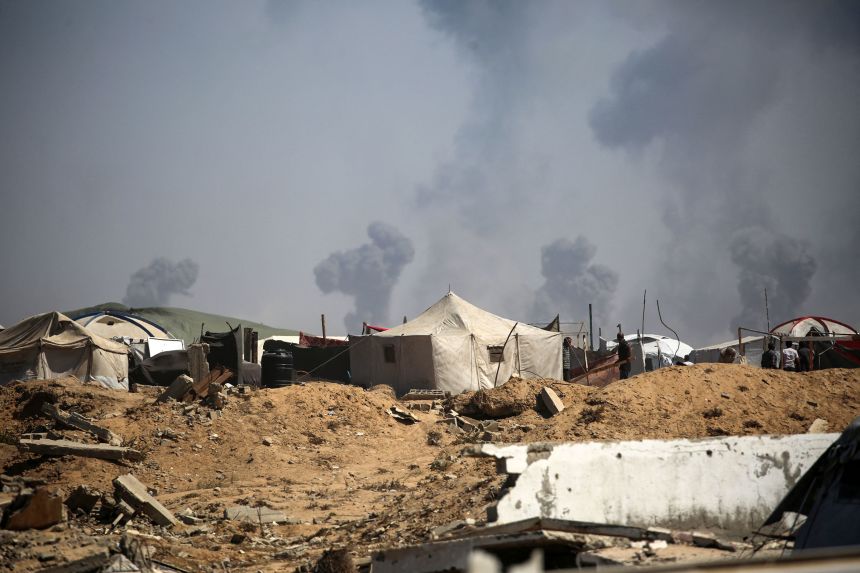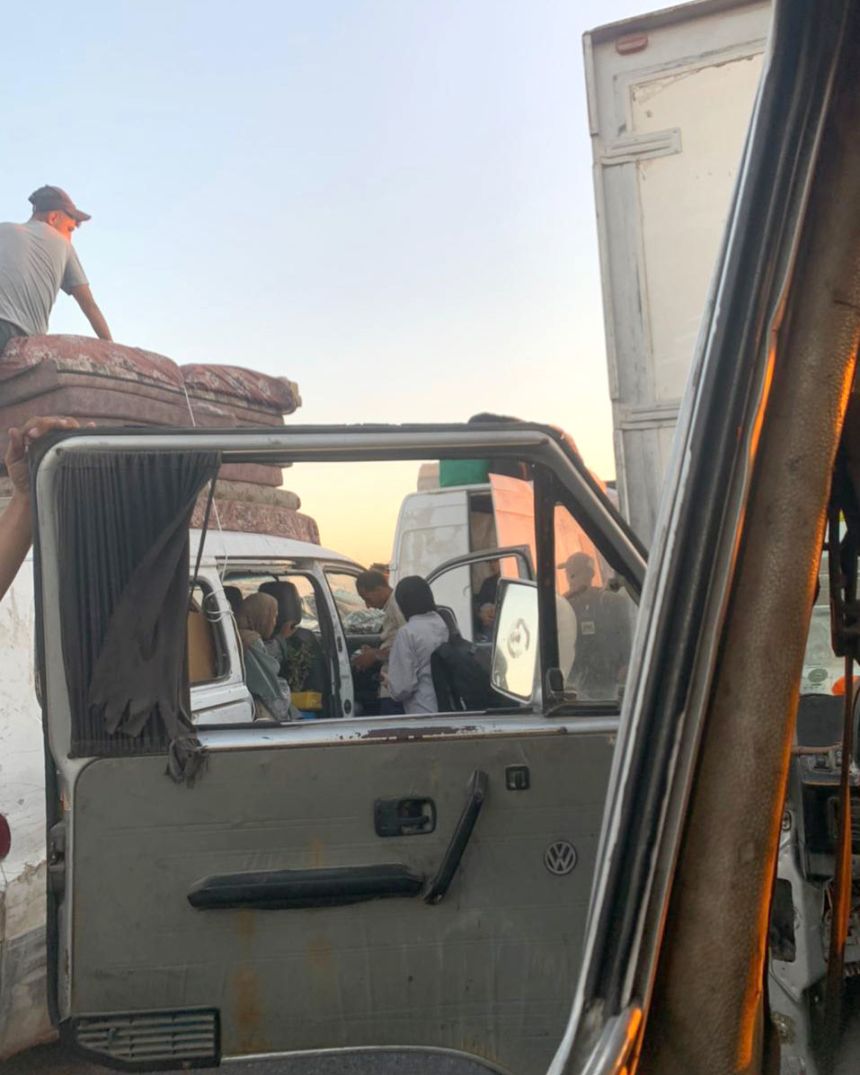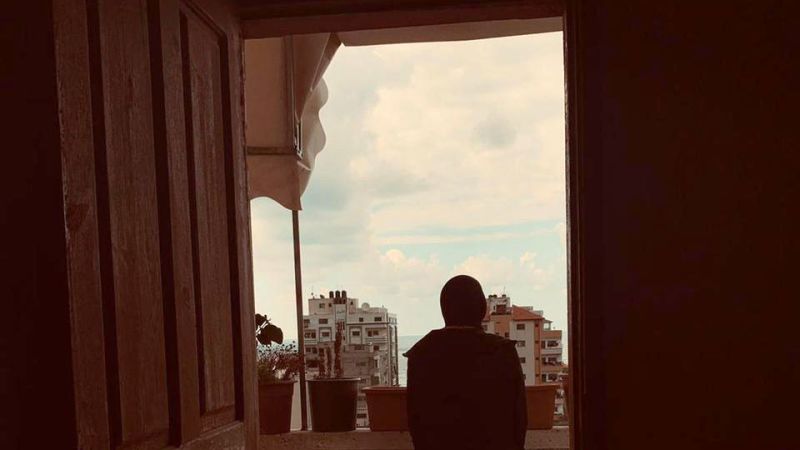A 22-year-old Palestinian student planned to be in the US this month, preparing her dorm room ahead of starting her first semester at an American university. Instead, she is still in Gaza, desperately trying to gather food, water and internet access after being forced to flee her home in Gaza City after Israel launched a ground operation to seize an area where approximately a million people live.
“You’re just escaping and just going to nowhere,” she told CNN by phone this week. “I just wake up crying. I just sleep crying. I was hoping (for) something far away from what I’m living right now and what I’m living right now is like a nightmare.”
In the fall of 2024 the student, whose identity CNN is withholding due to concerns about retaliation, was admitted to study computer science in the US. But her plan was abruptly derailed when the Trump administration introduced a new policy last month to reject all non-immigrant visa requests from Palestinian Authority passport holders.
Her acceptance to an American university was “the light at the end of the tunnel” after living through a nightmare in Gaza.
Just weeks after the latest Gaza war began in 2023 following the October 7 Hamas attack, she found herself next to her brother when an Israeli strike injured him.
“My brother was full of blood, and we were just turning in the streets, and bombs are – everywhere,” she said. “I took them as a fuel, as a fuel to continue, because a stop is never a choice.”
She has prioritized pursuing her education, which was abruptly upended when the war began almost two years ago, and Israeli bombing forced her local university to shutter its doors.
Her acceptance at an American College was the culmination of her efforts as she described ambition being her hobby, even while destruction and devastation dominated her life.
“You don’t have the choice to stop in every moment, and every second. You need to have a plan to the second, to the next second, in your life,” she said.
Some students cried for days feeling their “dream collapsing,” as one other student described, after the new visa policy was put into place. For her, it was another barrier – but not a dead end.
“The suspension hit hard for me, but I was never, never shocked, because what it what else in this world seems realistic? Actually, nothing seems realistic,” she said. “I actually just can’t handle anymore – we Palestinians, especially Gazans, are being forced – with our whole being – and we don’t give up.”
As she embarked this week on a 7-hour journey to southern Gaza, she made sure all of her university application documents were on Google drive. She plans to apply to another university outside the US for next year. But she also hopes there could be a change to the policy so she can come to the US.
The State Department gave no indication they are planning to allow a carve-out of their current policy for students, calling every visa decision a national security decision.
“The Department has paused the processing of nonimmigrant (NIV) visas for individuals traveling on a Palestinian Authority passport while we conduct a full and thorough review of the process and procedures used to vet individuals from Gaza,” a State Department spokesperson told CNN. “We will take the time necessary to conduct a full and thorough review.”
Last year more than 450 American university students held Palestinian passports, according to the Institute of International Education’s Open Doors data.

Applying to American universities during the war meant taking risks that were sometimes life threatening for each of the almost half a dozen Palestinian students who shared their stories with CNN.
“The process of applying for this scholarship and submitting documents could have literally cost me my life every single time,” another Palestinian student who was accepted to pursue a PhD in physics in the US told CNN. “I had to walk for an hour to reach a border area near Egypt just to catch a weak internet signal, because all communications and internet were completely cut off, all while bombs were falling over my head.”
She has two young children and believed that attending an American program could save them – while death has been all around them.
“If the sea were made of ink, it would not be enough to describe the atrocities we are experiencing,” she said, explaining the killing of many loved ones and dozens of forced displacements she and her family have been through.
She is not alone in her determination to advance her education for the sake of her children and their safety.
Another 40-year-old Palestinian pharmacist with three young children told CNN that his children were just as invested in the process as he was.
“My kids were so eager,” he said, “Asking me when we go to the States, we went to the consulate, when will they give you the visa? Oh, my God, who knows.”
But the steps he took in seeking to secure his master’s degree in public and global health in the US were “harsh” and “unimaginable.”
Finding transcripts when schools were shuttered, getting recommendations from former colleagues navigating loss and fleeing their homes due to Israeli bombings and finding internet access made every step of the process treacherous.
He was also trying to contact these people in Gaza while he was in Egypt, having fled with his family during the early months of the war.
“I have a lot of connections in Gaza, in my field – but how could I find some available, who is having, you know, who have a good internet access. And who it would be suitable and convenient for me to ask him such a question while he is in death, let’s say, in hell,” he said.
One of the people who wrote him a recommendation was a doctor who had just gotten out of the hospital himself after being injured. Once he found internet he got the student his recommendation – without any major delay.
But despite his acceptance, the former pharmacist is now facing the heartbreaking reality that his dream will not come to fruition in the near-term due to the new visa policy.
“The harsh reality is that when you just felt that you are arriving – at this summit, let’s say everything has just changed in one second,” he said.

Breaking the news to the Palestinian student that they would no longer be able to travel to the US anytime soon after they had finally found a source of hope, was a heavy burden for the activists who were supporting them through the application and visa process.
“It was a very difficult conversation,” said Juliette Majid, the founder of Student Justice Network (SJN), adding that the new blanket refusal policy dramatically complicates their situations.
Dozens of Palestinian students worked with SJN, a pro-Palestinian student group, which has helped them to navigate the complicated logistics of applying to and pursuing an American education while the war continues.
The Trump administration has not provided any direct information to the students about the new visa policy, or the rationale for enacting it.
The sweeping new policy was communicated to US diplomats in an August cable from Secretary of State Marco Rubio, ordering all embassies and consulates to refuse nonimmigrant visas to “all otherwise eligible Palestinian Authority passport holders” who are using that passport to apply for a visa. The posts were instructed to do so immediately.
A State Department spokesperson said that “every visa decision is a national security decision,” without expanding on the rationale for the new policy.
Preventing the students who had been accepted to US universities from traveling take up the places they had worked so hard to earn has meant a loss of three years of education for most students. The last time most of them were in school was during the fall of 2023, and now they are looking elsewhere in the world to find opportunities for the fall of 2026.
“They essentially have to restart the entire university application system from scratch,” Majid said. “These are people who have been trying to finish their education under bombardment, under mass displacement, and it’s absolutely cowardly and disappointing of the administration.”
